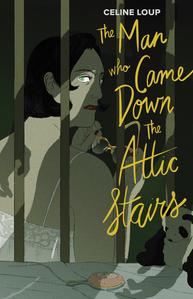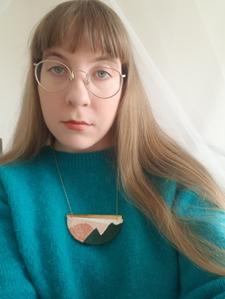 The Man Who Came Down the Attic Stairs by Celine Loup (Archaia/BOOM! Studios, September 24)
The Man Who Came Down the Attic Stairs by Celine Loup (Archaia/BOOM! Studios, September 24)
In The Man Who Came Down the Attic Stairs, Emma starts out happy in her new home with a new baby. But quickly she sees her world turn upside down: her newborn cries repeatedly at night as though it's scared of something or someone. Emma and her baby's sleepless nights cause uncharacteristic tension with her husband, and soon Emma begins to see strange things in the house and questions what's real and what's not. And then she wonders if something is haunting the nursery--and haunting her husband, who went up to the attic when they first moved in.
The Man Who Came Down the Attic Stairs is a mix of horror and suspense that captures "the isolation of postpartum depression while exploring the very real fears associated with motherhood," says author Celine Loup, author of the comics Honey and Mother, an illustrator for the New Yorker, Variety, Lucky Peach and the New York Times as well as the recipient of an Ignatz Award nomination. "Motherhood brings so much joy to the women who experience it, but for many it can feel like a prison, and no one can be certain until they've crossed a point of no return how it will be for them."
The book was inspired by Shirley Jackson and Ira Levin, whose work Loup's mother introduced her to when she was young and saw that Loup reacted strongly to movies like The Birds, Rebecca, Psycho, The Haunting, The Stepford Wives and others. "Stories about emotionally suppressed women felt true while a lot of young adult fiction failed to reflect my experiences," Loup says. "So these authors offered a kind of shelter for me growing up. Then, as an adult, navigating the realities of the narrow reproductive and professional choices open to me, drawing a horror comic about motherhood offered me the same personal catharsis I felt reading Jackson and Levin as a kid."
 |
|
| Celine Loup | |
Loup emphasizes that horror is "uniquely positioned in its power to transgress the barriers we put between ourselves and the other.... Horror strips away our defenses, sublimates our deepest fears, our ugliest impulses, and gives us the opportunity to face them in a safe way so that we may have greater compassion for ourselves and each other." She offers several examples. One is when her father watched The Silence of the Lambs, "noticing how every shot with tiny Jodie Foster in a room of men was shot at her eye level and how he felt the weight of the mens' lingering, hungry gaze on her in a way he'd never felt before." Ridley Scott's Alien "allowed cis men to experience a kind of vulnerability (forced pregnancy and birth) that for them is firmly located in bodies not like their own." And in Get Out, "the arrival of the police at the end of the protagonist's fight for survival signals, for a terrifying moment, not his salvation but his almost certain doom--and no white person in the audience can shrink away from that awful, sickening truth."
Loup hopes that The Man Who Came Down the Attic Stairs will help overcome the general "overwhelming pressure not to voice ambivalence about motherhood," she says. "There is still so little compassion for women who do not, for whatever reason, immediately fall in love with their babies and the taking care of them.... We take it for granted that mothers should experience life a certain way, and then blame them when they crack under the pressure. I don't think it has to be this way, but nothing will change until childcare, education, housing, health care, etc., is socialized. Any individual solution I could offer (like admonishing men to participate more in child care and homework, even though they should) will not fix the structural problems that keep mothers and their families scrambling to stay afloat."

